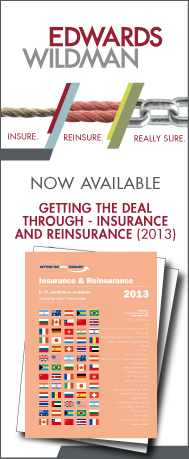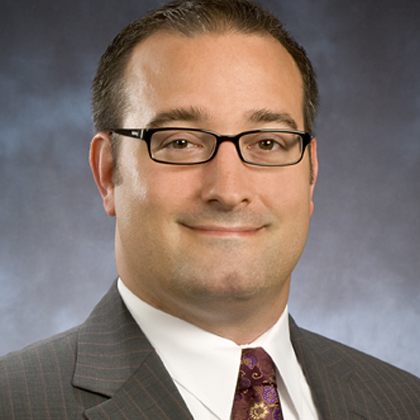 |
|
| edwardswildman.com | |
Connecticut Insurance Producers Take Note: Long-Term Care Insurance and the Duty to Advise by Alfred J. Kritzman (Hartford) Insurance producers selling life and health insurance in Connecticut are increasingly involved in advising on their clients’ long-term care needs, i.e., the services associated with the activities of daily living once people are no longer able to care for themselves.1 Increased opportunities to provide advice, however, come with greater risk. Cultivating the trust of a client and acting as an advisor, including making insurance coverage recommendations, may differentiate a producer from the competition. This type of client relationship—while lucrative to the producer and beneficial to the client—is a fiduciary relationship under Connecticut law and can give rise to liability to the producer for failure to advise clients on various coverage options. Many Connecticut producers are well-versed in life insurance and annuity products, but are often less familiar with long-term care insurance. This gap could lead some producers to inadvertently expose themselves to liability by failing to educate their clients on the various coverage options for long-term care insurance. A Growing Market with Imminent Needs According to recent projections, Connecticut’s 60-and-over population will increase significantly over the next decade.2 As Connecticut’s population ages, the need in the state for long-term care will also increase dramatically. The cost of long-term care can be paid for out of pocket, by private insurance, or by Medicaid if the person is eligible. To be eligible, Medicaid recipients in Connecticut must first spend down their assets to $1,600 for a single person and $2,400 for a couple. Unfortunately, the cost of long-term care is so expensive that some studies show one-third of people who pay out-of-pocket for long-term care in a Connecticut nursing facility will eventually exhaust their life savings and ultimately qualify for Medicaid.3 Accordingly, purchasing the right long-term care insurance policy is critical for Baby Boomers who seek to preserve their assets. Long-Term Care Insurance with an Asset Protection Feature The Connecticut Partnership for Long-Term Care (the “Partnership”) is a program of the State of Connecticut that works in alliance with private insurers to create a long-term care insurance option to help policyholders plan to meet their future long-term care needs without depleting their assets to pay for care. Under the Partnership, private insurers offer special Partnership policies that not only pay for long-term care, but also have a unique Medicaid Asset Protection feature not available in other policies. This feature provides dollar-for-dollar asset protection by allowing one dollar of savings from Medicaid spend-down rules for every dollar a Partnership policy pays out in benefits. For instance, when determining Medicaid eligibility, if a person’s Partnership policy has paid $200,000 in long-term care benefits, that person may apply to Connecticut’s Medicaid program for assistance and will not be required to spend down $200,000 in assets to be eligible. This spend-down protection is in addition to Medicaid’s other exclusions and allowances. Forty states offer similar partnerships between state regulators and the private insurance industry. Of those, 39 offer reciprocity, under which a person who acquired a long-term care insurance policy meeting partnership qualifications in one of these states may enjoy the same protection from the Medicaid spend-down requirement in another reciprocal state. To sell, solicit or negotiate long-term care insurance policies in Connecticut, a resident or non-resident insurance producer must be licensed by the Connecticut Insurance Department under the accident and health lines of authority. To sell, discuss or market Partnership policies, a producer must also be Partnership certified. Certification requires two steps: (1) successfully completing an online training course and examination; and (2) attending a half-day classroom training session. As of June 2013, there are 57,185 producers licensed for accident and health insurance in Connecticut, but very few of those are certified. Fiduciary Obligations to Clients in Connecticut’s Long-Term Care Market Existence of a Fiduciary Relationship Under long-established Connecticut law, when an insurance producer procures a policy affording protection against a designated risk, there is an obligation to perform the duty assumed with reasonable care, and there may be liability for any loss properly attributable to a failure to meet that standard. Ursini v. Goldman, 118 Conn. 554, 559 (1934). The relationship between a client and an insurance producer is often a fiduciary one “because of the . . . complexity of the insurance industry and the specialized knowledge required to understand all of its intricacies. . .” Fradianni v. Protective Life Ins. Co., 2011 WL 5925165, at *5 (Conn. Super., Nov. 4, 2011). Importantly, under Connecticut law, insurance producers do not automatically have a duty to advise their clients as to adequate coverage unless they have a “special relationship.” Grossenbacher v. Ericson Agency, 2000 WL 487264, at *5 (Conn. Super., Apr. 10, 2000). To determine whether a “special relationship” exists, the courts evaluate whether:
Bush v. MONY Life Ins. Co. of Am., 2008 WL 4874137, at *8 (D. Conn. Nov. 10, 2008). Courts have construed “special relationship” narrowly, focusing on the procurement of the specific insurance policy and the nature of that policy. Id. Duty to Advise Connecticut law has traditionally found that producers owe a duty to advise their clients about the adequacy of coverage if a special relationship exists between them. Three Superior Court cases from over 20 years ago are often cited for setting this precedent. See Sportsmen’s Paradise v. Peerless Ins. Co., 1992 WL 26848, at *2 (Conn. Super., Feb. 6, 1992), Winter v. Nationwide Mutual Ins. Co., 1990 WL 283942, at *1 (Conn. Super., May 24, 1990), and Katz v. Frank B. Hall & Co. of Connecticut, 3 Conn. Sup. C. Rpt. 25 (Oct. 30, 1987). In each case, the court confronted this issue on a motion to strike and determined that the existence of a fiduciary relationship was a question of fact. Although each case cited Connecticut precedent, they also relied on a New Jersey Superior Court Appellate Division opinion, which stated the following relevant points:
Sobotor v. Prudential Property & Cas. Ins., 491 A.2d 737, 741 (N.J. Super. App. Div. 1984) (superseded by N.J. L. 1993, c. 156, § 1, N.J. Stat. § 17:28-1.9). In Sobotor, the insured brought suit against the insurer and insurance agent for failing to advise him of the availability of higher amounts of uninsured-underinsured motorist coverage. The insured had met with the agent to discuss coverage and requested the “best available” package of automobile insurance coverage. Without advising him of the available options, the insurance agent provided the plaintiff with the statutory minimum limits of uninsured motorist coverage. Subsequently, the plaintiff was involved in a serious automobile accident where the offending driver maintained minimum liability coverage. The court found for the plaintiff, confirming that a fiduciary relationship existed and ordering the policy reformed in the plaintiff’s favor. As noted, the Sobotor decision was superseded by statute in New Jersey. However, Connecticut’s courts have continued to rely upon Sobotor for its reasoning. See Grossenbacher, 2000 WL 487264, at *6. In that case, the plaintiffs/insureds had not obtained the automobile insurance coverage at issue from -- or even discussed such coverage with -- the producers, who had only procured the plaintiffs’ homeowners’ insurance. The court distinguished these facts from those in Sobotor, and reasonably found that “no unique degree of trust and confidence existed between the parties, nor did the duty of the defendants to the plaintiffs extend to providing unsolicited advice on coverage with regard to policies not procured through them.” Id. Conclusion While the case law does not establish a universal fiduciary duty of Connecticut insurance producers to advise clients of coverage options every time a long-term care insurance policy is sold, they do present a cautionary tale. If a producer acting as a trusted advisor knows that its client’s primary concern is asset preservation, then that producer must make recommendations that optimize the preservation of assets. Advice regarding long-term care insurance is paramount in planning for long-term care needs. Thus, Connecticut insurance producers who act as advisors should consider offering Partnership policies as an option for their clients’ needs. The author thanks Alan Leibowitz, a licensed Connecticut life and health insurance producer, for his assistance on this article.
ENDNOTES
1 The activities of daily living ("ADL") are defined as "dressing, bathing, eating, toileting, continence and transferring." Conn. Agencies Regs. § 38a-475-2(e). "[A]n ADL deficiency is determined by reference to the need for substantial human assistance or supervision in performing that activity." Id. 2 The number of state residents age 60 and older is projected to be 811,655 in 2015 (22.27% of the state population), 937,745 in 2020 (25.33%), and 1,054,031 in 2025 (28.14%). Conn. State Data Center, http://ctsdc.uconn.edu/projections.html (Nov. 1, 2012). 3 C. Gruman and L. Curry, Spend-Down Patterns of Individuals Admitted to Nursing Homes in Connecticut, Discussion Paper #11-1999, Office of Policy and Management (Feb. 1999).C. Gruman and L. Curry, Spend-Down Patterns of Individuals Admitted to Nursing Homes in Connecticut, Discussion Paper #11-1999, Office of Policy and Management (Feb. 1999). 4 Expertise can be demonstrated through professional certifications, e.g., Certified Long-Term Care Advisor (“CLTC”), Chartered Life Underwriter (“CLU”), Chartered Financial Consultant (“CFC”), or Certified Financial Planner (“CFP”). Contact
| |
 |
|

